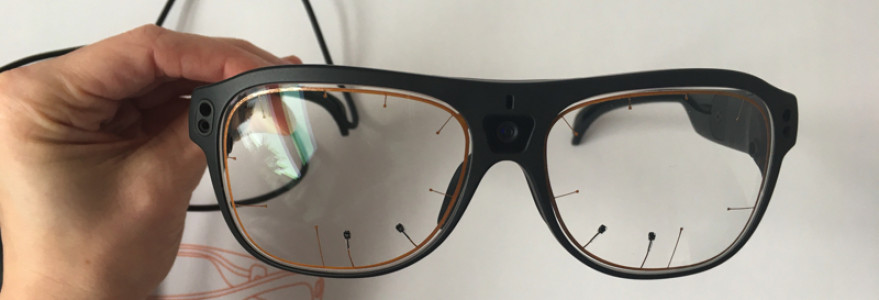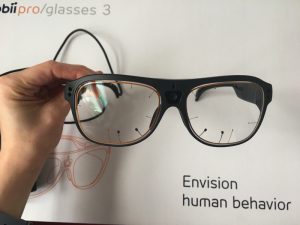In spring 2021, 14 scientific groups obtained funding for the purchase of new research infrastructure from the “Excellence Initiative – Research University’ Programme” (IDUB). According to the funding rules, access to the equipment will be granted not only to the teams that applied for the infrastructure. It will be available – based on agreed principles – to other research teams from the University. The first equipment has already been purchased – eight eye trackers requested by the Faculty of Psychology. They have been tested and are ready to use.
The coordinator of the infrastructure project “Mobile eye tracking equipment for the study of human cognition” is Dr. Alicja Niedźwiecka of the Faculty of Psychology. She received 202 thousand PLN for the purchase. The call for applications was announced within the framework of IDUB Action I.4.2 “Fund for the Renovation and Development of Research Infrastructure” (Priority Research Area II “Beyond Micro and Macro Worlds”).
Improving Autism Diagnosis
Dr. Niedźwiecka is a member of AutismLabUW, the Center for Autism Spectrum Disorders Research at the Faculty of Psychology. Mobile eye trackers will be used in one of the Center’s projects, “Tell your story. Social communication in autism: computational approach”. The researchers, led by Dr. Izabela Chojnacka, will use artificial intelligence and natural language processing in the analysis of speech of people with Autism Spectrum Disorders (ASD). They aim to develop computational methods for the analysis of communication in autism. The study is funded by the National Science Centre. The purchase of eye trackers will allow the team to add data on eye movement to the project.
“Our project focuses on how people with ASD tell stories, how they describe what they see, whether they use emotionally significant language or abstract words. So far, speech analysis has required human participation. The team of Dr. Chojnacka wants to use artificial intelligence to look for defined patterns in speech. It will improve the diagnostics of ASD”, explains Dr. Niedźwiecka.
Eye trackers will enable AutismLabUW to collect additional data on communication of people with ASD. While talking, we look at our interlocutors, make eye contact with them, or withdraw our eyes. Eye trackers record eye movements and gather data on fixations (focus our gaze on a single point) and saccades (quick movement of eyes from one point to another). “Our eye trackers have a built-in microphone that allows us to combine speech data with sight data in an easy way”, says Dr. Niedźwiecka.
Eye-trackers at your fingertips
Eye trackers funded from the IDUB budget are available to all researchers conducting scientific projects at the University of Warsaw. The Faculty of Psychology purchased three Tobii Pro Glasses 3 eye trackers and four Pupil Core eye trackers. The equipment is easy to use. The gathering of data does not require special skills or training.
A study participant puts on glasses and data is collected through a small receiver (Tobii Pro Glasses 3) or a wire connected to a computer (Pupil Core). After the examination is completed, you can download data from the Tobi receiver to the computer.
“Data analysis requires expertise. For researchers who have no experience with using eye trackers, I recommend Tobi equipment. It has user-friendly software that helps to interpret the data. The basic software for Pupil Core eye trackers is open source. However, it is advisable to have at least one team member with programming skills who can add dedicated software. It helps to compile data”, explains Dr. Niedźwiecka.
As part of the IDUB infrastructure call for applications, all submitted proposals were subjected to public consultation. Members of the University community could submit comments on the projects or express interest in access to the infrastructure. The eye trackers aroused interest of the researchers from the faculties of Polish Studies, Economic Sciences, and Physics.
“We purchased seven eye tracking devices to share them with as many researchers as possible. The equipment is assigned to the Faculty of Psychology, but it belongs to the hole University”, underlines Dr. Niedźwiecka.
To learn more about the technical specification of the Tobii Pro Glasses 3 and the Pupil Core eye trackers, as well as their possible applications in research, please visit the website: https://isz.uw.edu.pl/en/idub-research-infrastructure.
Researchers interested in the equipment are requested to contact Dr. Alicja Niedźwiecka using the online form >>




